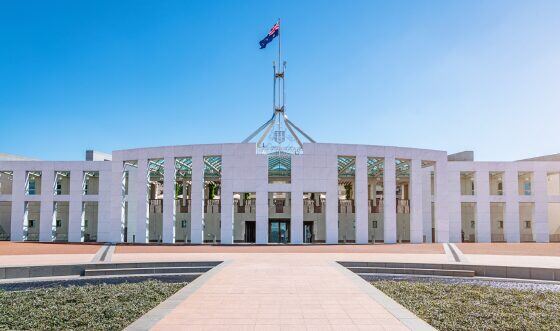
Jamie Leach, Raidiam’s Open Data Strategist, looks at the data sharing challenges the Australian government and public sector is facing and shares her recommendations for success.
The concept of data sharing is not new. We can trace its roots all the way back to Robert King Merton’s research of potential in 1942.
However, it wasn’t until 1995 that the term Open Data was coined in relation to the sharing of geophysical and environmental data. One could be forgiven for not noticing Open Data if you operated within a different field at that time.
Twelve years later, in 2007, when a group of internet activists and “forward-thinkers” held a forum in Sebastopol, California, the principles for the open source movement were promoted, and the focus on data sharing shifted to Public institutions.
Fast forward to 2024; a lot can change in 17 years, can’t it?
Addressing the same old crowd at Australian data sharing conferences
Well, in 2017, I presented on the topic of Open Data at an Australian government data conference – this generated lots of interest and some great questions from the audience.
In 2018, I switched it up to encourage “The seven characteristics of quality data” as an instrument of data sharing at an Australian government data conference. Despite making some of the audience rather nervous, I think I managed to share some wisdom and easy-to-follow tricks and tools.
In 2019, at an Australian government data conference, I spoke about what the rest of the world was doing with Open Data and data sharing, which is different from Australia. With a lot of the audience from the previous year in attendance, I thought I would not be as brutal as I had been the year before…
In 2020, I spoke at an Australian government data conference on the need to align public data sharing to the Consumer Data Right.
In 2021, I chaired a virtual conference on ways to start sharing data, also in Australia, for the government.
2022, COVID hit and there was no conference.
2023, I went back to Canberra to present at an Australia government data conference on the incompatibilities between the Data Availability and Transparency Act and the Consumer Data Right – both identified as intersecting on the horizons for the Australian Data Sharing roadmap. At this point, I stopped being subtle. After years of addressing the same government departments and a room filled with data champions, sponsors and experts, I was starting to get frustrated at seeing the same wheels spinning year after year.
In two weeks, I will be returning to Canberra to speak at another Australian government data conference, DataGov 2024. This year, I will be taking a practical approach to my presentation.
Data sharing is not hard. And the benefits of getting it right are immense – to both the consumer and the country. Numerous reports are floating about that place a quantified economic benefit if we unleash the potential of shared data, somewhere between AU$49b and AU$232b, depending on which paper you read.
The concept is rather simple if you take a principles-based approach. Obviously, there are legal ramifications if you don’t get it right. Privacy must, of course, be paramount. Here is my advice for any government departments that are considering data sharing and overcoming the challenges associated with it.
4 data sharing tips for government departments
- Use data standards
Data standards play a crucial role in ensuring the consistency, reliability, and effective utilisation of shared data. Data standards provide rules and guidelines for collecting, formatting, and storing data consistently. These standards ensure that the data is accurate and reliable. The fallacy that standardisation of data removes competitive advantage is dangerous and untrue. When data adheres to standards, it becomes easier to identify and rectify any discrepancies or errors, leading to higher data quality. They also ensure that the storage and sharing of data is managed with appropriate and consistent levels of security, ensuring that trust is established and maintained.
2. Implement robust governance frameworks
Data is most valuable when it can be aggregated and shared. However, privacy and security concerns often hinder data sharing. The federal and state governments recognise this, but more needs to be done. Australia’s public sector faces a perception problem related to consent, privacy, and government use of citizens’ data. Regulatory frameworks around owning, storing, and sharing data are essential to realise the true benefits linked to the Digital Economy.
3. Modernise data architecture
Many government agencies still operate with outdated data systems. Modernising these architectures is crucial for efficient data sharing. Upgrading infrastructure and adopting standardised data formats can enhance interdepartmental collaboration and data sharing. That’s the beauty of what we do here at Raidiam. Our Trust Platform – Raidiam Connect – provides the critical infrastructure to do this and uses the most secure global open security standards. It’s designed to complement existing IT architecture, sitting as a layer on top to provide the capabilities and functionality to enable secure data sharing.
4. Bridge the skills gap
The public sector lacks skilled professionals who can effectively manage, analyse, and interpret data. Bridging this talent gap is essential for unlocking the full potential of data sharing and analytics within government agencies. Australia is falling behind nearby countries in the number of data-science graduates year-on-year. A recent report identified only 3% of domestic students enrolled in information technology subjects, of which only a percentage will focus on data. More than 13% of international students were enrolled in the same subjects.
Hiring consultants to develop data sharing plans and projects can only go so far. When the slide deck has been delivered, who is left behind to keep the programme running? Without a full transfer of knowledge, skilled improvement, and collaboration, it is difficult to address the talent issue. It is a very big problem.
So, as I start to pack my bags for Canberra, I am excited to see what progress we have achieved as a nation over the past year. The benefits to all will be immense if we can get the ball rolling in the right direction.
Interested in learning more about how we deliver secure and trusted data sharing ecosystems? Get in touch today!
Jamie Leach is Open Data Strategist at Raidiam. She is a frequent speaker/author on the transformative potential of data and passionate about sharing global best practices.



